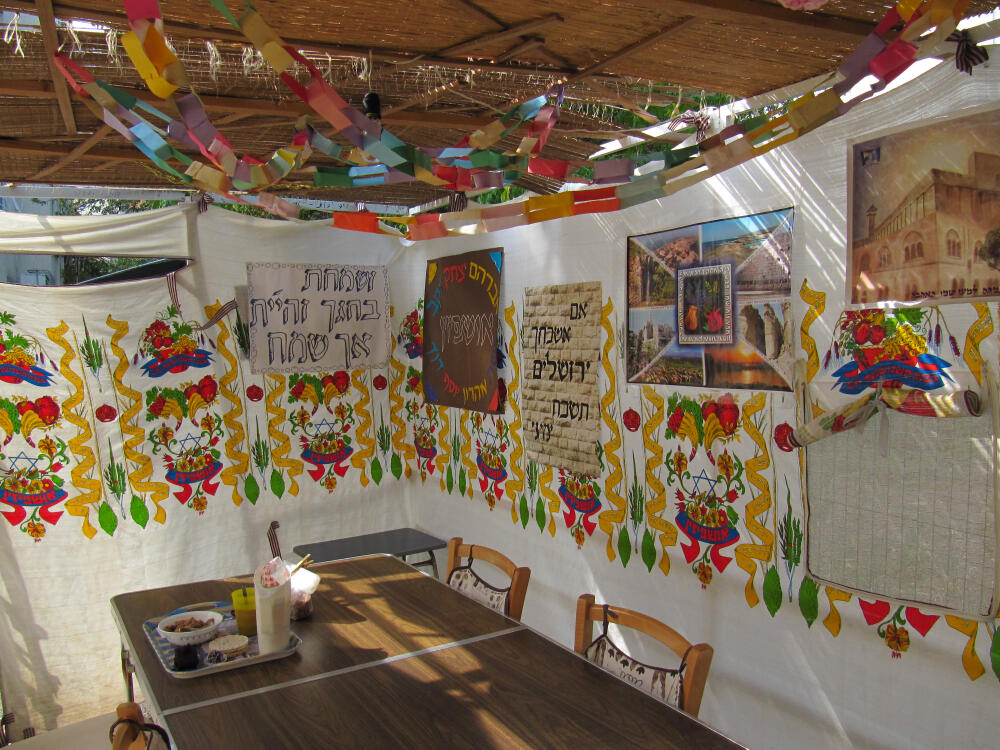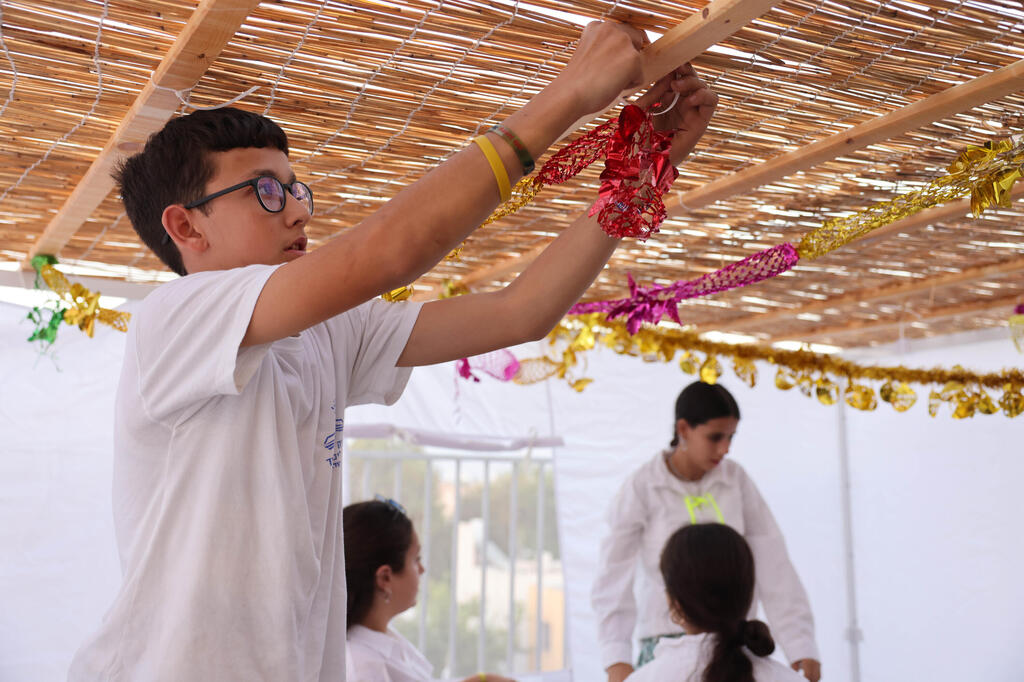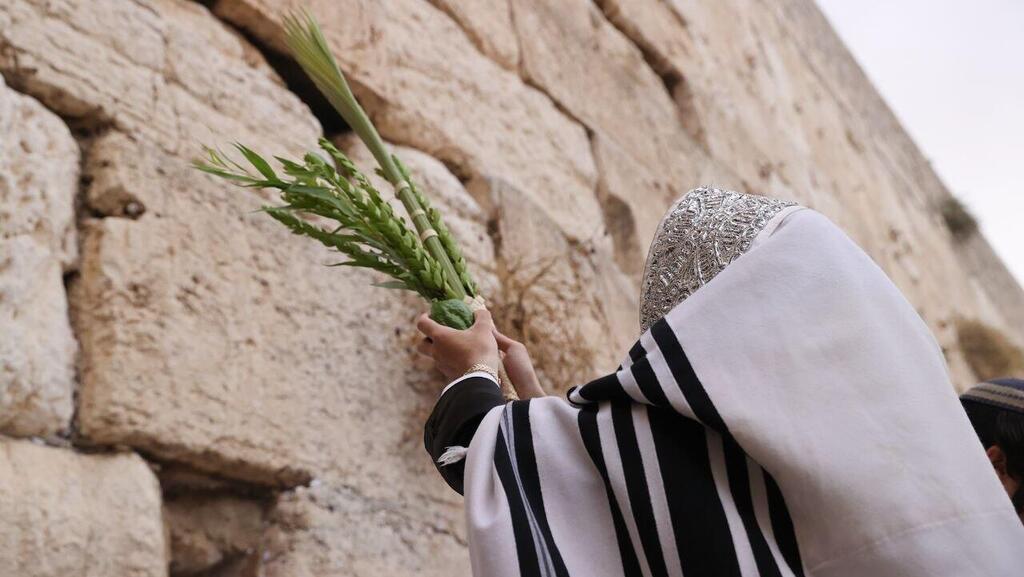Getting your Trinity Audio player ready...
Sukkot is the last of the fall or Tishrei holidays on the Jewish calendar. Here is a brief look at some of the laws of the harvest holiday.
Why are all the holidays in succession?
A woman once asked me, "Couldn't the holidays have been arranged in a more balanced way? Why is there a sequence of holidays so close together: Rosh Hashanah, Yom Kippur and Sukkot?"
On Rosh Hashanah and Yom Kippur, a person is supposed to detach from bodily needs and focus on the soul. This is seen most acutely on Yom Kippur, where no care is given to the body.
However, a person is not meant to remain only at this level. Only angels have nobody. We have a body, and the true test is in combining the spirit with the body. This is the purpose of Sukkot. Sukkot is a holiday that is entirely physical in that we fulfill mitzvot by eating in the sukkah and sleeping in the sukkah, among other activities.
5 View gallery


Praying with the four species at the Western wall in Jerusalem
(Photo: Alex Kolomoisky)
Sukkot creates a special connection between the High Holy Days and the entire year. The essence of Sukkot is to examine whether we succeed in bringing the spiritual wealth we gained during the High Holy Days into our daily lives, into our physical existence.
Rejoicing on Sukkot
The Torah describes Sukkot as a festival of joy: "And you shall rejoice in your festival... and you shall have nothing but joy" (Devarim 16:14-15); "And you shall rejoice before your God for seven days" (Vayikra 23:40). Sukkot is characterized as a festival of joy also in the words of our Sages. In prayer, we refer to Sukkot as "the time of our rejoicing." Maimonides (Hilchot Lulav 8:12) also describes Sukkot as a festival of extra joy.
Sukkot is characterized by joy. All festivals have joy, but Sukkot has extra joy. In all festivals, joy is ancillary to the holiday, but in terms of Sukkot, it seems that joy is part of the holiday's purpose.
How can we rejoice this year?
Indeed, it's difficult to rejoice. In recent days, I was again visiting the wounded in Tel HaShomer Hospital. A few days ago, I was at a soldier's funeral (Tzvi Marantz HY"D). As I write these lines, I spoke with the father of a soldier who was killed and with a hostage who was released from captivity. However, amid all the difficulties, we must remember that we are in a period of redemption. Thank God, after thousands of years, we have merited to return to the Land of Israel, we have merited a state, we have merited an army. Thank God, after thousands of years, we can see the bravery of our soldiers, the mission of the soldiers' families, and the great miracles that occurred to us in this war (such as the missiles from Iran, the success with the explosions of beeper communication devices, the elimination of Hezbollah's leadership, and more). Joy does not negate the challenges; On the contrary, joy allows us to cope with the difficulties. The war is not only on the battlefield. The war is also on the home front. The enemy tries to stop us from feeling joy. We will rejoice, but we will not forget the soldiers, the hostages, the families of the fallen, the wounded and those evacuated from their homes.
We can invite as Ushpizin - the special guests from the Bible - to our succah in addition to the regular Ushpizin also a soldier who fell and one of the hostages, who, God willing, will return soon. On Simchat Torah, we can dedicate each hakafah (circle of dancing with the Torah) for others who were affected by the war.
Laws of the sukkah
One should not make a sukkah under a tree or under a roof, and the s'chach (cover of the succah) under a tree is considered invalid (Shulchan Aruch, 626:1, according to the latter opinion). If the tree branches cover an area of four-by-four tefachim (32 cm), that place is invalid and one should not sit under it. If the branches are four tefachim wide and extend over the entire sukkah, the entire sukkah may be invalid for use.
5 View gallery


Sukkah in the heart of Ein Kerem in Jerusalem, on the roof of a house from the Ottoman period
(Photo: Courtesy of Yonatan Schiller)
How to make the walls of the sukkah?
The walls can be made of any material, provided it can withstand a normal wind (Shulchan Aruch, 630:1).
Ideally, it's good to have four walls (except for the entrance), but the sukkah is also kosher with only three walls. And the third wall doesn't need to be complete, just slightly more than half is sufficient. The minimum length of a wall is seven tefachim (70 cm according to the Chazon Ish), so a wall of four tefachim is sufficient.
The walls do not need to reach the s'chach. It's enough if they are 10 tefachim high (1 meter according to the Chazon Ish; 80 cm according to R' Chaim Na'eh), and we consider them as if they continue up to the sky. This is a halacha given to Moses at Mount Sinai called 'gud asik mechitzata' (Shulchan Aruch, 630:9).
What is kosher to be used as s'chach?
One should not use s'chach made of metal, plastic, glass (which is made from sand nowadays) and the like, but one can use any detached plant, provided it doesn't receive tumah, or ritual impurity, from the Torah or rabbinically, such as wooden utensils that have a "receptacle" (Keilim, 2:41).
S'chach Forever: Mats that are usually made for lying on receive tumah and are invalid for s'chach, while mats that are made for roofing usually do not receive tumah and are kosher for s'chach (Gemara, Sukkah 19-20; Shulchan Aruch, 629:6). Today, there are 'S'chach Forever' mats designed for s'chach (and certainly not intended for lying on) and can be used on top of the sukkah. The s'chach has a kashrut certification, testifying to its proper production (for example, when the pieces forming the s’chach are connected with wooden or linen threads and not plastic threads).
Eating in the sukkah
The Mishnah (Sukkah 25) states: "One may eat and drink casually outside the sukkah." That is, one should not eat a fixed meal outside the sukkah, but it is permissible to eat a temporary, casual meal outside the sukkah. Let's detail briefly:
1. Bread or mezonot (made with grain, including dishes like pasta and couscous) in an amount more than a k'beitzah (56 cc, about the volume of two matchboxes) – must be eaten in the sukkah.
2. Meat and fish – may be eaten casually, but it's proper to be stringent and not eat them as part of a meal (like lunch) outside the sukkah.
3. Fruits and vegetables – may be eaten even in large quantities outside the sukkah.
4. Drinking – permitted in any quantity, but one should be stringent and not drink wine in a fixed manner outside the sukkah.
These laws relate to the core law and define the boundary between a fixed meal and a casual meal, but one who wishes to be stringent and careful to eat even a casual meal in the sukkah is praiseworthy.
Sleeping in the sukkah
The Gemara (Sukkah 26) states that one should not sleep outside the sukkah. Over the years, many have been lenient regarding sleeping in the sukkah.
The Mordechai (Sukkah, 741) wrote that people who fear the cold that is prevailing in the sukkah are considered as suffering discomfort and are exempt from the sukkah, and this is brought in the Rema (639:2). In Shulchan Aruch HaRav (639:8) wrote that one can be lenient in this only if the discomfort and trouble are such that the person would refrain from sleeping in his house under similar circumstances.
The Rema (639:2 and in Darchei Moshe there) defended those who are lenient in another way. According to him, the mitzvah is for a man to sleep with his wife, as he would sleep at home, and since usually his wife cannot sleep in the sukkah, the husband is also exempt from the sukkah.
This year, due to the war, in places where there are concerns about sleeping in the sukkah due to the distance between the sukkah and the safe room, one should sleep at home and not take risks
All these reasons are in the category of judging favorably, and it seems that in the diaspora many were concerned about sleeping in the sukkah, but in the Land of Israel, one should strive to have a sukkah suitable and comfortable for sleeping and to sleep in the sukkah as much as possible.
This year, due to the war, in places where there are concerns about sleeping in the sukkah due to the distance between the sukkah and the safe room, one should sleep at home and not take risks.
Trips during Sukkot
The Gemara (Sukkah 26) says that "travelers" are exempt from the sukkah. That is, when a person is traveling (during day or night or both) he is exempt from the sukkah. Responsa Yechaveh Da'at (Vol. 3, 47) and Igrot Moshe (Orach Chaim, Vol. 3, 93) ruled in accordance with Rashi's words, that one who goes on a trip for pleasure is not allowed to eat outside the sukkah, while our teacher Rabbi Aharon Lichtenstein zt"l (Alon Shvut 90) ruled that from a halachic perspective one can be lenient in this matter, since the law of travelers is based on "teshvu k'ein taduru" (dwell as if you live), and a person usually travels all year round, as per the Rashba's reasoning. However, although he was lenient from a halachic perspective, Rabbi Lichtenstein strongly opposed this from a value and educational perspective, because "a person from Israel should be full of aspiration and longing for mitzvot, and not, God forbid, see them as a burden... from which he frees himself at the first opportunity", especially in a mitzvah that is available to him only one week a year.
Indeed, often there is importance in going on trips during Chol HaMoed, as children are on vacation, and many parents also take time off (and it's good that they do!), and the joint trip is important for family bonding. It seems that in this situation there is room to travel, but it is proper not to rely on the exemption of 'travelers', but to conduct oneself in a way that does not require this exemption, and to eat breakfast and dinner in the sukkah, while during the day, to eat only casual meals (as we explained above, for example fruits or vegetables and snacks whose blessing is borei nefashot). In this way, we will both fulfill the mitzvah properly and allow for a family trip.
The Blessing of 'Leishev BaSukkah'
The Talmud (Sukkah 46) says: "When one enters to sit in it (the sukkah), he says: “Baruch atah……., Melech haolam, asher kid'shanu b'mitzvotav v'tzivanu leisheiv basukkah". The Rishonim disagreed on when to make the blessing. In practice, the Shulchan Aruch (639:8), the Rema (ibid.) and the Mishnah Berurah (ibid., 46) ruled that one blesses only when eating in the sukkah.
In light of this, one should say the blessing before eating. On which eating should one say the blessing? One who eats bread the size of an egg or mezonot in the amount of a fixed meal certainly blesses, as these things require a sukkah by the strict meaning of the law. The Mishnah Berurah (639:16) writes that the common custom is to bless even on eating a k'beitzah of mezonot (56 cc) but added that in order to avoid a concern of saying a blessing in vain, one should stay in the sukkah a bit after eating and intend in the blessing both for the eating and for the stay.
One who said the blessing 'leishev basukkah' and ate, and then remained in the sukkah until the next meal, or went out for a short time with the intention of returning immediately and did so – does not bless again (Mishnah Berurah, 639:47). However, if one went out for business or to the synagogue or other errands, when he returns and eats in the sukkah, he blesses 'leishev basukkah' again (ibid.).
May we merit to see great yeshu’ot soon, that our soldiers will be victorious in the war, that no soldiers or civilians will be harmed, that the hostages will return soon healthy and whole, and that we will all merit to sit together in our Holy Land, in unity, love, and peace.
Rabbi Yosef Tzvi Rimon is the Rosh Yeshiva of the Jerusalem College of Technology, President of the World Mizrachi Movement, head of the "Sulamot" association and the Chief Rabbi of Gush Etzion
Get the Ynetnews app on your smartphone:




